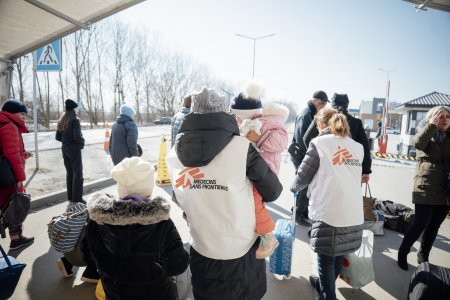 Peter Bräunig/MSF
Opinion
Peter Bräunig/MSF
Opinion
04/08/2022
Michaël Neuman
Thierry Allafort-Duverger
In a country with a solid medical infrastructure and faced with a large-scale international mobilisation, what is the place of MSF in Ukraine and beyond? "We are not currently in the front line of emergency care provision," write Thierry Allafort Duverger and Michael Neuman, who see our work in limited areas, particularly with those "left behind," and in the longer term.
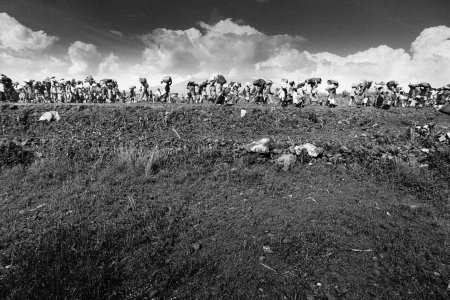 Remco Bohle
Review
Remco Bohle
Review
03/10/2022
Marc Le Pape
The film Empire of Silence, directed by Thierry Michel, examines the massacres committed in the Democratic Republic of the Congo from 1996 to the present. In this blog, Marc Le Pape introduces the film’s structure, some of the principal witnesses to the mass executions and some of the military and political actors responsible for them, and Congolese reactions to their impunity.
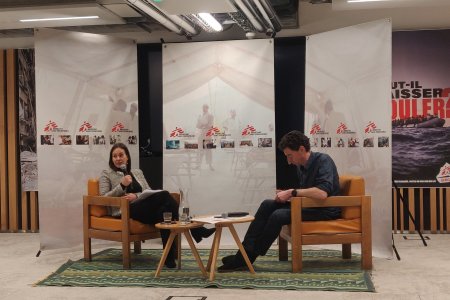 Conference
Conference
02/17/2022 - 06:30 PM 08:30 PM
Vanja Kovacic
The members of the Crash team were happy to welcome you all to an online conference-debate with anthropologist Vanja Kovačič, on Thursday 17th of February, at 6:30PM. The conference was in English and simultaneously translated into French. The author introduced her recently-published book "Reconstructing lives Victims of war in the Middle East and Médecins Sans Frontières" (Manchester University Press, translated in French and Arabic.)
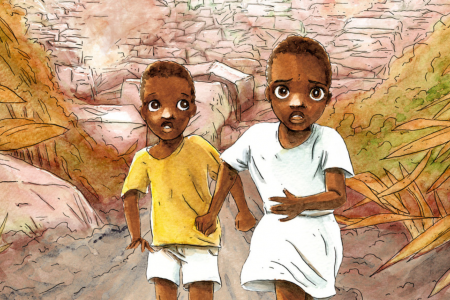 News in brief
News in brief
11/17/2021
Jean-Hervé Bradol
The comic book "Le Grand Voyage d'Alice" was drawn by Gaspard Talmasse and published by La boîte à bulles on November 17th. The preface of this comic book was written by Dr. Jean-Hervé Bradol, former president of MSF and director of studies at the Reflection center of MSF (MSF-Crash). The book won the MSF prize at the Carnet de voyages Festival in Clermont-Ferrand, held from November 19th to the 21st.
 Opinion
Opinion
10/27/2021
Mego Terzian
In his book, La Traversée. Une odyssée au cœur de l’Afrique, Patrick de Saint-Exupéry challenges the reality of Hutu Rwandan refugees’ hunt and massacre facing the advancement of the Rwandan Patriotic Army and their Congolese allies in 1996-97. This systematic exercise of denying reality – especially the denial of the Mapping Report written by the Office of the United Nations High Commissioner for Human Rights (1143 pages, published in June 2009) – but also this denial of Human Rights Advocacy groups’ investigations, and those of journalists’ witnesses present in DRC at the time – does not spare MSF’s teams who came to help these refugees in 1996-97. However, as a front-line witness of the Tutsi genocide in Rwanda, MSF was also one of the organizations noticing the intense violence perpetrated by the new Rwandan political regime in Zaire / DRC back in 1996 and 1997, mostly against a population constituted at three-quarters of women and children.
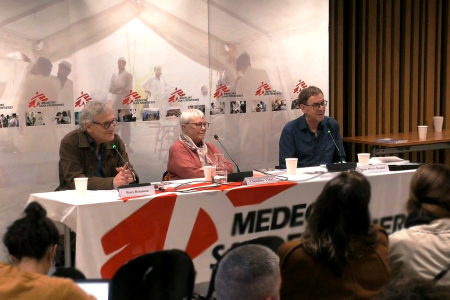 msf
Conference
msf
Conference
11/17/2021 - 06:30 PM 08:30 PM
Jean-Hervé Bradol
We were very happy to welcome two authors of the book: sociologist (CNRS) and Crash scientific committee member Claudine Vidal, and Jean-Hervé Bradol, doctor, former President of the French section of MSF and current director studies at the Crash, for the launching event of the newly-published book “Violences extrêmes. Enquêter, secourir, juger République démocratique du Congo, Rwanda, Syrie” (Éditions de la Maison des sciences de l’homme, Paris 2021). The event was hosted by Rony Brauman.
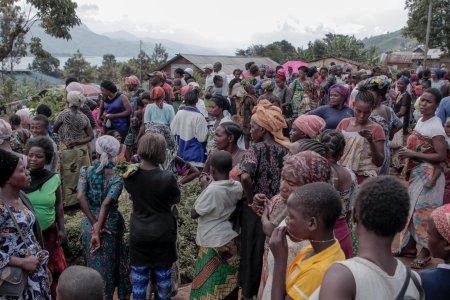 Yves Ndjadi
Book
Yves Ndjadi
Book
09/23/2021
Laëtitia Atlani-Duault
Jean-Hervé Bradol
Marc Le Pape
Over the last few years, Rwanda, the Democratic Republic of Congo (DRC) and Syria have been places where situations of extreme violence took place. As witnesses and investigators of such, the authors of this book shed light on three key-moments that marked these tragic episodes: the investigation, the intervention of emergency relief teams and the implementation of justice procedures leading to judgement.
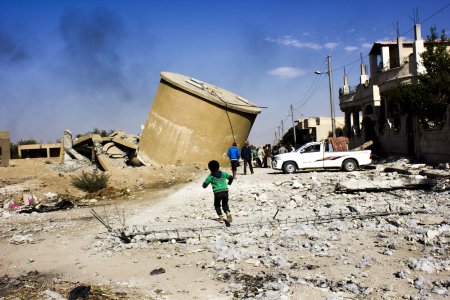 Diala Ghassan/MSF
Analysis
Diala Ghassan/MSF
Analysis
03/15/2021
Hakim Khaldi
This article was first published in Issue 2, Volume 2 of The Journal of Humanitarian Affairs.
How can a medical humanitarian organisation deliver emergency assistance in Syria when there is nowhere in the country where civilians, the wounded and their families, medical personnel and aid workers are not targeted? Not in the areas controlled by the government, nor in those held by the Kurdish Democratic Union Party (PYD), Islamic State of Iraq and the Levant (ISIL) or the different rebel groups. So what action could be taken, and how? Remotely or on site? At the very least, we had to decipher the diverging political and military agendas, and then adapt, persist or sometimes just give up. In this article, I will present the full range of methods used to acquire knowledge and obtain information as well as the various networks used to carry out this venture. I will also show how Médecins Sans Frontières’ operations became a balancing act, punctuated by episodes of adapting to the various difficulties encountered.
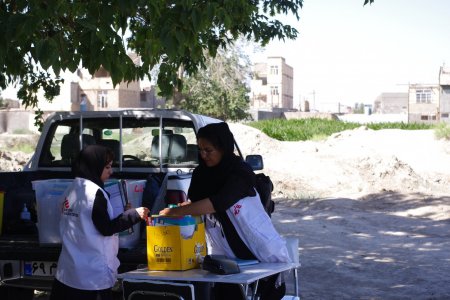 MSF
Analysis
MSF
Analysis
09/18/2020
Fabrice Weissman
On the 31st January, a symposium was held at Sciences Po in support of Fariba Adelkhah and Roland Marchal, researchers at Sciences Po's Center for International Research (CERI) who were arrested in Iran on June 5, 2019. Roland Marchal was released on 20th March 2020 in exchange for an Iranian engineer detained in France. On 6th May Fariba Adelkhah was sentenced to 6 years imprisonment for "propaganda against the political system of the Islamic Republic, and collusion to undermine national security". The researcher was offered conditional release on condition that she terminates her research, but she refused.
The symposium brought together diplomats, journalists, humanitarians and researchers, with the aim of "nourishing reflection about prisoners and hostages, from a political, legal and ethical point of view". Fabrice Weissman presented the experience of Médecins Sans Frontières in the face of kidnappings.
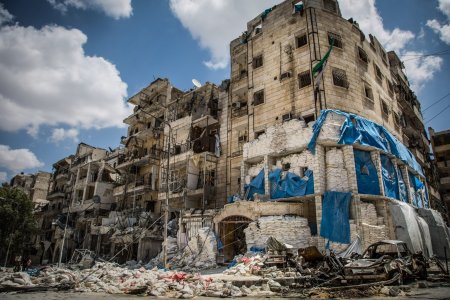 Karam Almasri
Analysis
Karam Almasri
Analysis
02/20/2015
Jean-Hervé Bradol
How to intervene with the civilian populations in the middle of the war in Syria? Jean-Hervé Bradol, director of studies at Crash and former project coordinator for the northern part of Syria in 2013, testifies about the negotiations carried out in Syria in cities taken by groups affiliated to Al Qaeda or the Islamic State. This article was published on the Mediapart website on February 1, 2015.
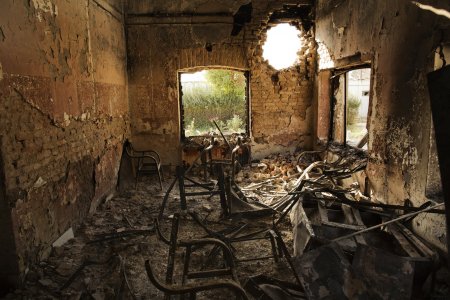 Victor J. Blue
Analysis
Victor J. Blue
Analysis
11/22/2019
Xavier Crombé
Joanna Kuper
This article seeks to document and analyse violence affecting the provision of healthcare by Médecins Sans Frontières (MSF) and its intended beneficiaries in the early stage of the current civil war in South Sudan. Most NGO accounts and quantitative studies of violent attacks on healthcare tend to limit interpretation of their prime motives to the violation of international norms and deprivation of access to health services. Instead, we provide a detailed narrative, which contextualises violent incidents affecting healthcare, with regard for the dynamics of conflict in South Sudan as well as MSF’s operational decisions, and which combines and contrasts institutional and academic sources with direct testimonies from local MSF personnel and other residents. This approach offers greater insight not only into the circumstances and logics of violence but also into the concrete ways in which healthcare practices adapt in the face of attacks and how these may reveal and put to the test the reciprocal expectations binding international and local health practitioners in crisis situations.
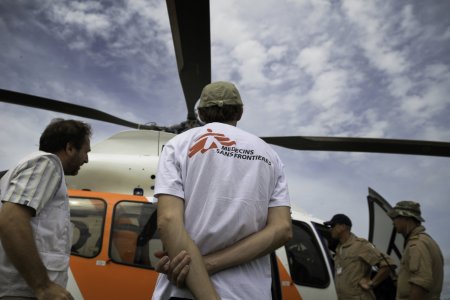 Robin Meldrum/MSF
Analysis
Robin Meldrum/MSF
Analysis
11/22/2019
Fabrice Weissman
This article discusses the policy of absolute secrecy on abductions adopted by aid organisations. It argues that the information blackout on past and current cases is to a large extent a function of the growing role of private security companies in the aid sector, which promote a ‘pay, don’t say’ policy as a default option, whatever the situation. The article contends that secrecy is as much an impediment to resolving current cases as it is to preventing and managing future ones. It suggests abandoning the policy of strict confidentiality in all circumstances – a policy that is as dangerous as it is easy to apply – in favour of a more nuanced and challenging approach determining how much to publicise ongoing and past cases for each audience, always keeping in mind the interests of current and potential hostages.
 Peter Bräunig/MSF
Opinion
Peter Bräunig/MSF
Opinion







